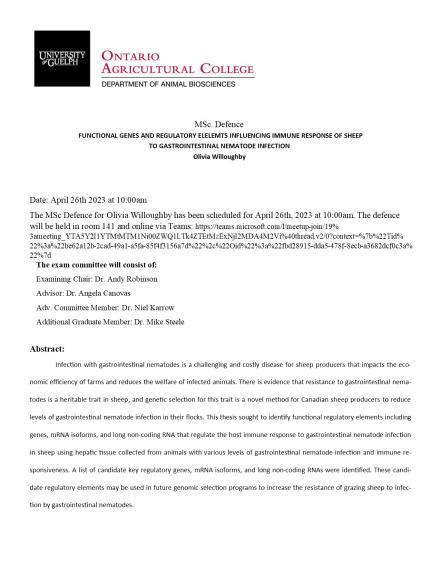Oliva Willoughby's MSc Defence
Date and Time
Location
Room 141 and Teams: https://teams.microsoft.com/l/meetup-join/19%3ameeting_YTA5Y2I1YTMtMTM1Ni00ZWQ1LTk4ZTEtMzExNjI2MDA4M2Vi%40thread.v2/0?context=%7b%22Tid%22%3a%22be62a12b-2cad-49a1-a5fa-85f4f3156a7d%22%2c%22Oid%22%3a%22fbd28915-dda5-478f-8ecb-a3682dcf0c3a%22%7d

Details
Infection with gastrointestinal nematodes is a challenging and costly disease for sheep producers that impacts the economic efficiency of farms and reduces the welfare of infected animals. There is evidence that resistance to gastrointesti-nal nematodes is a heritable trait in sheep, and genetic selection for this trait is a novel method for Canadian sheep produc-ers to reduce levels of gastrointestinal nematode infection in their flocks. This thesis sought to identify functional regulatory elements including genes, mRNA isoforms, and long non-coding RNA that regulate the host immune response to gastroin-testinal nematode infection in sheep using hepatic tissue collected from animals with various levels of gastrointestinal nem-atode infection and immune responsiveness. A list of candidate key regulatory genes, mRNA isoforms, and long non-coding RNAs were identified. These candidate regulatory elements may be used in future genomic selection programs to increase the resistance of grazing sheep to infection by gastrointestinal nematodes.